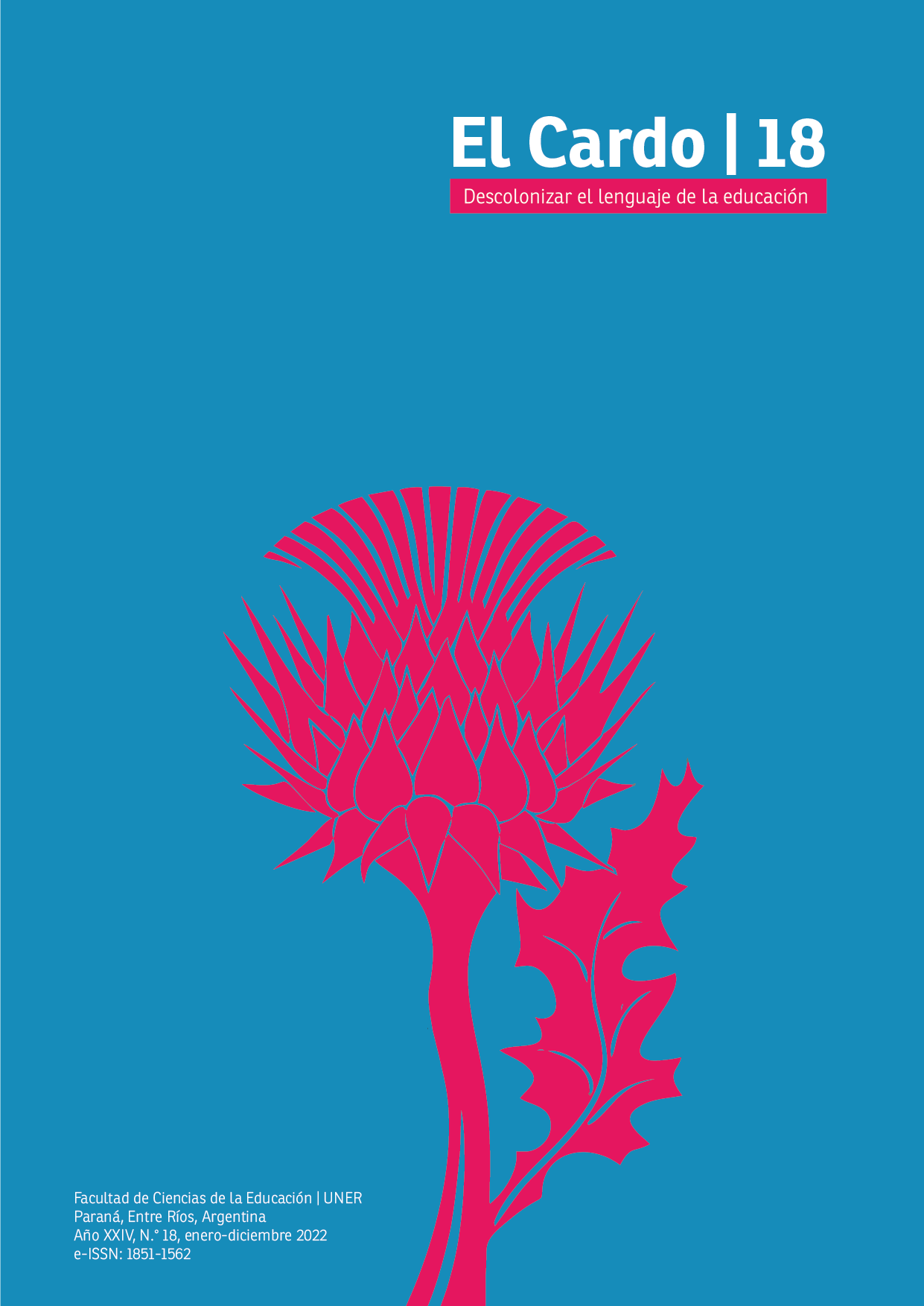Epistemología y género en clave latinoamericana: críticas historiográficas desde una investigación situada
Contenido principal del artículo
Resumen
Este trabajo refleja algunos de los principales aportes teóricos a los que se arribó tras un diseño metodológico cualitativo propio de la implementación crítica de una investigación educativa en un contexto especifico de formación docente. Desde el área que integra la formación general de los y las futuras docentes, emergieron los principales resultados de este estudio humanístico, pedagógico e historiográfico. Está enmarcado, dentro de los roles didácticos de su docente- investigador, como parte de los procesos evaluativos llevados a cabo durante el primer semestre el año 2020, en plena pandemia del COVID-19 en un instituto gremial de nivel superior con una larga trayectoria pedagógica y sindical en una jurisdicción perteneciente a la región de Cuyo, en el centro- oeste de Argentina. Se pretende principalmente subrayar desde el estudio de caso. los aportes epistemológicos socialmente construidos sobre algunos problemas latinoamericanos de la historiografía de género en el ámbito académico descrito.
Fecha de recepción: 27/4/2022
Fecha de aceptación: 27/8/2022
Descargas
Métricas
Detalles del artículo

Esta obra está bajo una licencia internacional Creative Commons Atribución-NoComercial-CompartirIgual 4.0.
Citas
Abero, L. (2015). Investigación educativa: abriendo puertas al conocimiento. Montevideo. 2 (1).
Anijovich, R. Gonzalez, C. (2018). Evaluar para aprender. Aique.
Arzaluz Lozano, S. (2005). La utilización del estudio de caso en el análisis local. Región y sociedad, Colegio de Sonora. 18 (32). pp. 107- 144. http://www.scielo.org.mx/pdf/regsoc/v17n32/v17n32a4.pdf
Bach, A, M. (2010). Las voces de la experiencia, el viraje de la filosofía feminista. Biblos.
Barrancos, D. (2004). Historia, historiografía y género. La Aljaba. 9 (1).
Barrancos, D. (2020). Historia mínima de los feminismos en América Latina. El Colegio de México.
Bianchi, S. (2013). Historia social del mundo occidental. Universidad Nacional de Quilmes.
Bedoya, J. (1998). Epistemología y pedagogía. Ecoe.
Davini, M. (2015). La formación en la práctica docente. Paidós.
Deleis, M. (2001). Mujeres en la política argentina. Aguilar.
Delgado, K. (1996). Evaluación y calidad de la educación. Magisterio.
Diaz, E. (2010). Metodología de las Ciencias Sociales. Biblos.
Diaz, E. (2017). Problemas filosóficos. Biblos.
Donoso, T., Pessoa, M. (2016). La perspectiva de género en la investigación educativa. Cadernos de pesquisa. 23 (3).
Espinosa Miñoso, Y., Gómez Correal, D., Ochoa Muñoz, K. (2014). Feminismo, epistemología y apuestas descoloniales en Abya Yala. Editorial Universidad del Cauca,
Espinoza, E. y Toscano, D. (2015). Metodología de investigación educativa y técnica. Universidad Técnica de Machala.
Feliu, M., Hernández, X. (2011). Enseñar y aprender historia. Grao.
Fuster, F. (2020). Introducción a la historia. Cátedra.
Gargallo, F. (2007). Feminismo latinoamericano, Revista venezolana de Estudios de la Mujer. 12.
Pineau, P. (2015). Políticas socioeducativas y formación docente. Ministerio de Educación de la Nación Argentina.
Rodríguez, J. (2005). La investigación acción educativa, ¿Qué es? ¿Cómo se hace? Doxa.
Santillán, F. (2015). Panorama de investigación educativa y de género en Latinoamérica. Cenid.
Stake, R. (1998). Investigación con estudio de caso. Morata.
Videla, H. (2021). La epistemología del archivo histórico como práctica académica situada. Revista Saberes y Prácticas, 6 (2).





